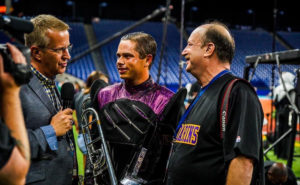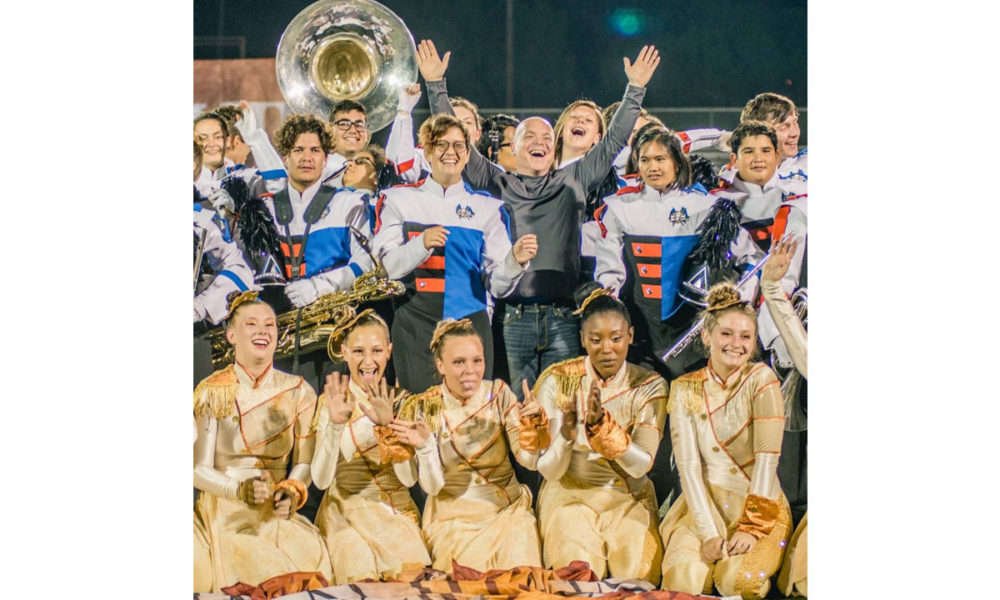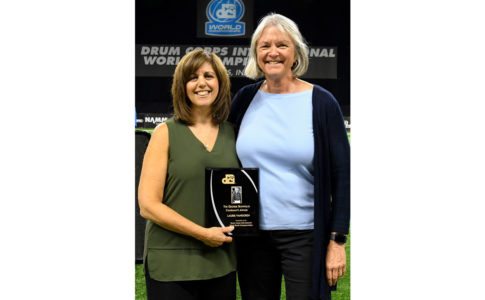Explore behind-the-scenes jobs beyond the director’s podium that help a marching program run smoothly.
 Marching band composer Key Poulan fell in love with the “Star Wars” score in 1977; the teenage trombonist wanted to play along with his soundtrack record, so he decided to isolate the first trombone part. “When I was in high school, I [started] trying to lift songs off of LPs or 8-tracks,” Poulan says.
Marching band composer Key Poulan fell in love with the “Star Wars” score in 1977; the teenage trombonist wanted to play along with his soundtrack record, so he decided to isolate the first trombone part. “When I was in high school, I [started] trying to lift songs off of LPs or 8-tracks,” Poulan says.
He later turned his hobby into a living as founder of Key Poulan Music.
For Rob Stein, owner of Standing O Marching, the passion began in high school as well. “When I was in high school, I knew I wanted to do marching band forever,” Stein says.
Stein’s company now designs complete shows for high school bands, including drill, choreography, and music.
From composer to drill writer to administrative and business roles, a variety of jobs—beyond band director—exist for people who want to be involved in the marching arts professionally when they grow up.
Arranger
 Halftime Magazine’s July/August 2008 issue featured a “Behind the Baton” segment by Carolina Crown drum major and past Jim Jones Leadership Award winner Evan VanDoren. Twelve years later, VanDoren is still living and breathing marching band every day of his life but now as a music arranger. “Being a drum major at Crown helped set me apart from other college grads when I was trying to get a job,” says VanDoren, who taught high school band in Texas for nine years before starting his own company, VanDoren Music.
Halftime Magazine’s July/August 2008 issue featured a “Behind the Baton” segment by Carolina Crown drum major and past Jim Jones Leadership Award winner Evan VanDoren. Twelve years later, VanDoren is still living and breathing marching band every day of his life but now as a music arranger. “Being a drum major at Crown helped set me apart from other college grads when I was trying to get a job,” says VanDoren, who taught high school band in Texas for nine years before starting his own company, VanDoren Music.
For VanDoren, the arranger experience is all about working on a freelance basis. “For now, the business is just me though I do name my dog employee of the month,” VanDoren says. “I’m called a solo-preneur. I have control over who I want to work with.”
In early July, VanDoren released a marching band arrangement and curriculum for “The Planets” that accounts for social distancing, virtual learning, and long student absences that may occur as a result of the COVID-19 pandemic.
 Ben Hylton, owner of Hylton Music Design, also got into arranging by starting out as an instructor. During his college years, Hylton taught at high school band camps. “I would find issues that needed to be fixed in the arrangement,” Hylton says. “As a staff member, I was allowed the freedom to help in that way.”
Ben Hylton, owner of Hylton Music Design, also got into arranging by starting out as an instructor. During his college years, Hylton taught at high school band camps. “I would find issues that needed to be fixed in the arrangement,” Hylton says. “As a staff member, I was allowed the freedom to help in that way.”
Tweaking bits of a music arrangement led Hylton to doing full songs rewrites, which then led to writing full shows. “It snowballed from there,” Hylton says.
Hylton says that marching band arrangers commonly get their start in the music education realm. Because music educators can accurately assess their program’s skill level, they can tailor an arrangement to their band’s unique strengths. “The production value of the show has to be at the skill level of the program,” Hylton says.
Composer
While Key Poulan began his career in arranging, a passion for composition began to take over. The complexity of copyright law became one of Poulan’s motivations for making composition an integral part of his career. Writing original shows was often easier than getting licenses to commercial music. “There was a big copyright infringement scare that happened in the late 90s,” Poulan says.
During his college years, Poulan studied music education, took music composition classes, and marched with the Blue Devils Drum and Bugle Corps. “I ended up being the arranger for the university band my senior year,” Poulan says.
Poulan then became a band director in California, where he started composing his own music for his ensemble’s shows. “The first composition I did was for the ‘Rise and Fall of Rome’ for my own band,” he says. “I’m 21 years into doing compositions for marching bands, and I haven’t looked back,” Poulan says.
Now Poulan works with bands on an individual basis. He often creates parts that fit the skill level of each of the various instrumental sections. He charges a flat rate for an eight-minute show, which is the same for both arrangement and composition, but says that buying original music can be more cost-effective for the ensemble. “The arrangement is more expensive because they have to pay for the licensing,” he says. “I’ve seen those licenses get astronomical.”
Drill Writer
 Like Poulan, Craig Fitzpatrick also started his business, Fitzpatrick Music, as a music arranger. However, drill writing—rather than arranging—set his business apart. Fitzpatrick, who marched in The Cavaliers Drum and Bugle Corps, originally went to college to become a band director as well but soon found that his true interest lay in writing, not teaching. “Writing drill was where I got the biggest,” Fitzpatrick says. “Some band directors feel more comfortable taking the reins putting a show together musically than writing the drill.”
Like Poulan, Craig Fitzpatrick also started his business, Fitzpatrick Music, as a music arranger. However, drill writing—rather than arranging—set his business apart. Fitzpatrick, who marched in The Cavaliers Drum and Bugle Corps, originally went to college to become a band director as well but soon found that his true interest lay in writing, not teaching. “Writing drill was where I got the biggest,” Fitzpatrick says. “Some band directors feel more comfortable taking the reins putting a show together musically than writing the drill.”
Drill writing isn’t just about the dots on the field; it’s about looking at a bigger visual picture. Hylton, whose company also writes drill, emphasizes a holistic approach, including drill, staging, and choreography. “Let’s say we’re about to come to a big climax point where [guard members] are going to come to the front and spin a silk. The silk has the same design as the prop in the back, and the music has the same feeling as the colors on the flag,” Hylton says. “It all has to be the same style and speak to the same effect.”
Different career paths have the potential to lead to a drill-writing position. Hylton suggests that an aspiring drill writer pursue a job as a teacher, visual tech, or visual caption head with a drum corps to gain the skills and connections necessary for seeking drill-writing work.
Band Camp Instructor
Before his first professional gigs arranging music and writing drill, Fitzpatrick worked as a high school band camp instructor, specifically running brass rehearsals.
Networking with fellow music majors and band mates helped him get those first few jobs. “My first camp was after I had marched with The Cavaliers,” Fitzpatrick says. “My friend’s dad was a local band director, and that’s where it started.”
Similarly, Hylton began teaching high school band camps right after graduating high school. “I was headed to college to study music education; I had made a good impression on a few band directors in my local area, [and they] hired me to teach trumpet sectionals, marching fundamentals, and drill learning,” Hylton says.
When Fitzpatrick began writing drill and arranging music, he also started teaching band camps for the schools that use his music and drill. While teaching band camps can be a good starting point for an aspiring arranger or drill writer, it can also be a continuing job. Fitzpatrick has continued to teach band camps every summer since 1999 up until the COVID-19 pandemic. “Most years, I have at least two full camps I teach,” he says.
To find a job working with a band camp, Fitzpatrick recommends connecting with local band directors. “Directors often like to find music majors, musicians with drum corps experience, or both,” he says.
Hylton suggests playing to your individual strengths when looking for a contracted instructor position. “Use what skills you have, … even skills that might be outside the realm of music,” Hylton says. “Are you into exercise? Maybe the band needs a physical trainer.”
Most importantly, put the program and the kids first when you choose to teach. “Becoming an instructor is not a valid way for you to live out your dreams of recreating a cool drum corps video you saw or boss around students because an instructor did that to you in high school,” Hylton says. “Become an instructor because you love band, and you want to keep the activity growing!”
Tour Director and Administrator
The role of tour director found Ricky Grasso always on the run. One year when the Blue Knights Drum and Bugle Corps reached a tour stop in Arkansas at 5 a.m., Grasso found cockroaches covering the gym floor where the group planned to stay. Grasso was tasked with finding a new gym on short notice. Another time, on a show day, a rifle fell on a member’s head. Grasso rushed her off to urgent care, then bought her a donut afterward.
Grasso served as tour director of the Blue Knights for the 2016, 2017, and 2018 drum corps seasons but now works as an administrative consultant. Unlike most arrangers, composers, or drill writers, Grasso has no background in directing or music education. He is a former Blue Knights member who has a bachelor’s degree in public relations and a master’s in business administration.
Grasso says that his communication skills directly translated to success as a tour manager. “You have to communicate with people from all across the [United States],” Grasso says. “You can’t talk to somebody from Utah the same as somebody from Texas.”
Grasso also communicated regional norms to the corps members. In Utah, for example, he required members to wear shirts during practice since the community is conservative.
Grasso’s job as tour manager was a seasonal position with a stipend for the summer. Mainly, he served as a liaison between other staff members and housing sites as well as doing food and airport runs—and, of course, being prepared to handle any situation that might arise, even cockroaches.
Gregory “GM” Kuzma’s path to being a chief operating officer (COO) started 25 years before he took the role. In 1994, he joined the Blue Knights as a mellophone performer, then went on to serve as a volunteer driver, cook, and social media manager.
Kuzma took the position of director of communications for Ascend Performing Arts, the parent organization of the Blue Knights, from 2014 to 2019, after which he became COO and director of operations. As COO, Kuzma rents practice facilities and provides administrative support to the ensemble’s directors.
For landing this type of administrative role at a not-for-profit, Kuzma recommends establishing relationships with those in the organization. “It may be starting by accepting an internship or volunteering to explore the organization within,” he says. “Maybe you’ll find a need or a project you can take on, thus creating an opportunity for [yourself].”
Entrepreneur
Many roles in the marching arts involve a level of entrepreneurship. Stein from Standing O Marching grew his business beyond a one-person freelance company into a corporation by employing multiple specialists.
Stein recalls sitting in a coffeeshop when he made the decision to start his company about 15 years ago. “I got a book on website building, so I could have a storefront for myself,” Stein says.
The search for clients began with good old-fashioned cold calling. “No one knew who I was,” Stein says. “I [called and] asked them if I could write their show. After enough calls, I had two bands that said yes.”
Last year, Standing O Marching worked with 75 bands. Specialization among employees has been one of the keys to the company’s success. Stein has a team of skilled percussion writers and visual designers. “I write wind parts,” Stein says. “I don’t write percussion, [and] I don’t write drill.”
Because of his experience and connections in drum corps, Stein says that he easily found employees to hire. Stein marched with the Jersey Surf and the Blue Devils and then went on to teach for multiple corps including The Cadets and Blue Devils B. “During my time teaching, I met a lot of great instructors,” he says.
The entrepreneurial route can work for a two-person family-owned business as well. Wayne Markworth, a retired band director from Centerville, Ohio, helped his son, Andrew, a composer and arranger, start Shadow Lake Music. “I’m the manager; I deal with the website, and I handle the accounts,” Markworth says. “The biggest motivating factor is that Andrew is my son.”


